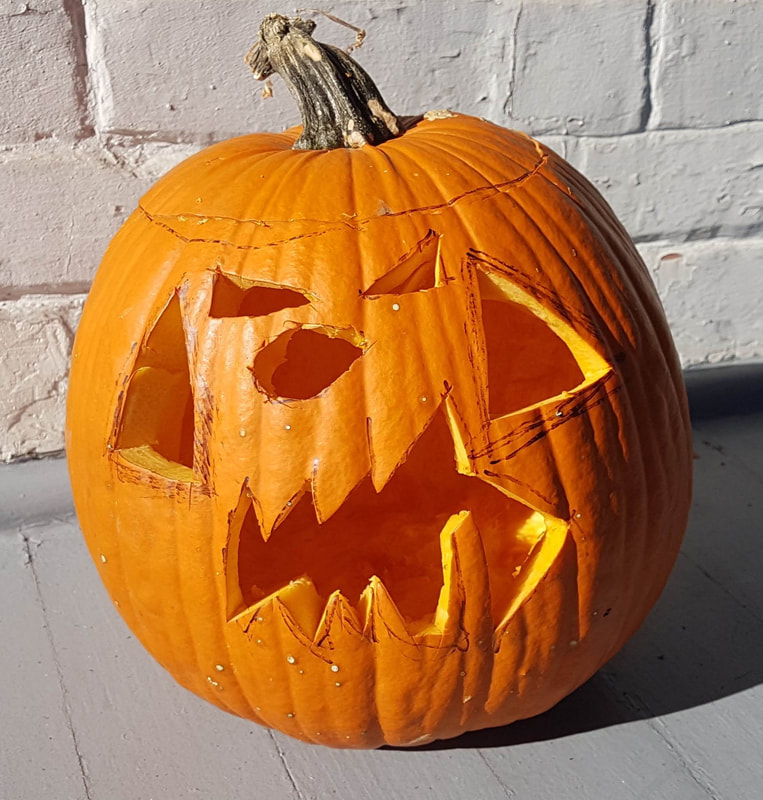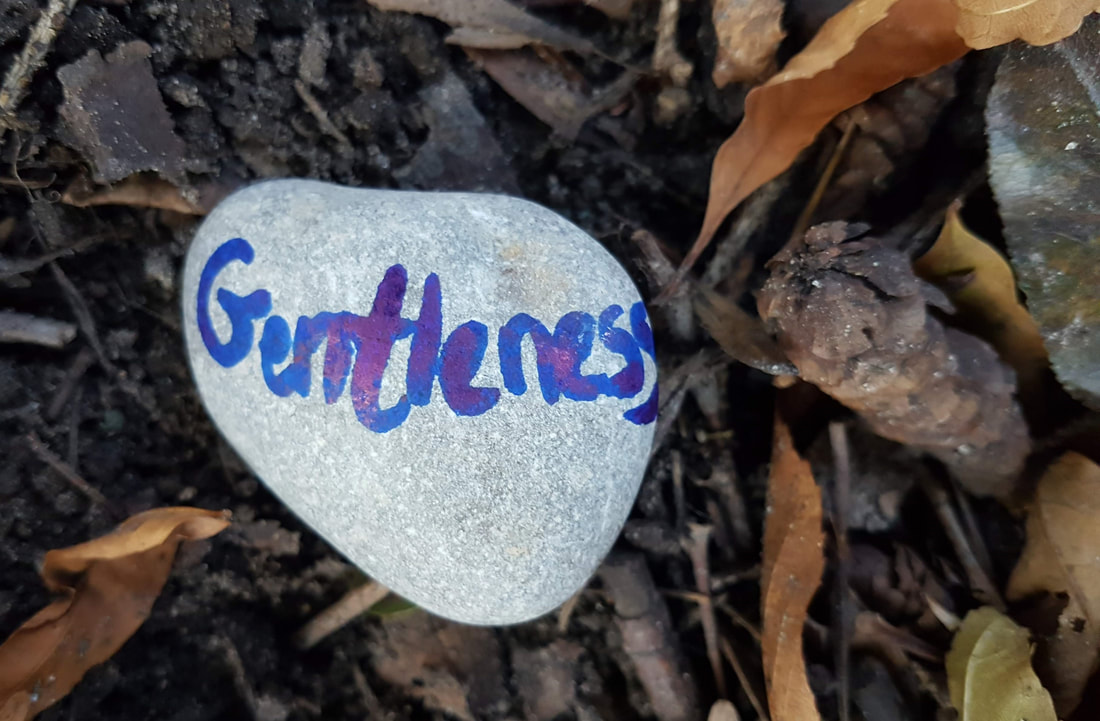|
Although I didn't grow up celebrating Halloween, I am loving some of the decorations I am seeing this year. There are friendly ghosts, giant spiders and webs, pumpkins with all kinds of faces. And yet, some of them are pretty scary! I am glad I'm not a kid - because I think I'd have nightmares!
Perhaps you read my first blog post - which was about why and how to feel feelings. Perhaps your response - whether conscious or not - is - But feeling feelings is too scary! What if I feel too much?! What if it hurts? Many of us fear our feelings, and for good reason. As such, I wanted to follow up with some explanation of why feeling feelings can be so hard - and, accordingly, why it can be so helpful to bring an attitude of self-compassion, curiosity, and patience with ourselves if we are learning to make more space for our feelings. So, here goes. Some reasons why feeling feelings can be so hard, in no particular order. 1. Biology. Some of us experience our feelings more deeply than others. Elaine Aron, PhD, has done important research on "highly sensitive people." In short, these are people (myself included) who feel our feelings more profoundly - whose feelings - both emotions and physical, as well as sensory experiences - are just more intense. When highly sensitive people have "good enough" caregivers as kids, and have developed the capacity to feel their feelings, they can make space for big emotions - which actually offers them special gifts and ways of contributing to society through their sensitivity. However, if, as is often the case, they were responded to when young with - "You are Too Sensitive" - they become ashamed or afraid of their big feels. Feelings become threatening - so much more so given how intense they can be! Making space for big feelings when you are a super-feeler who has been invalidated is definitely possible - but hopefully you can see how it could feel very intimidated. For more on the subject of biology as it relates to feeling, please see this excellent blog post by clinical psychologist Sarah Thompson. 2. Development. As I've alluded to above, our early development and responses we received from our primary caregivers strongly impact our relationship with our feelings. If we were ignored, dismissed, invalidated, or even penalized for expressing emotion, we begin to associate our healthy emotions with fear and/or shame. And who wants to feel fear or shame?! So, we learn to avoid even the healthiest of our feelings because of this pairing. Implicit family rules - which are often cross-generational - also play into things. If there was an unnamed rule of - "We don't express emotions in this family" - we learn that feelings are not ok, that they have no place. As kids, we may have learned to minimize, downplay, or ignore our feelings in order to fit in, to belong. 3. Society and Culture. Western society is pretty driven by productivity, I think. If we perform, produce, make a living, we are valuable. We tend to put more value on rationality and evidence then intuition and inner experience. We may get the societal message that our inner experience doesn't matter - all that matters is how much money we make or how many degrees we have or other external markers. I've also been thinking a lot lately about masculinity and I think things may be uniquely hard for men in terms of developing a capacity to connect to feelings. Men seem to grow up learning that "boys don't cry" and that feeling feelings or prioritizing relationships is [insert insult here]. This is obviously ridiculous - men can have rich inner worlds just like any other human being. But, in receiving these messages - whether implicit or explicit - men have nowhere to put their feelings, no outlet, no permission to feel or express. And so, the quest of feeling feelings may be unfamiliar at best; at worst, feeling feelings can be linked to the shame and fear of being (societally) ridiculed for being human. Many cultures and subcultures also have their own rules and stigmas against feeling and expressing feelings. I've actually done some work around stigma in the Jewish community around feelings and mental health. In response to hard feelings - and experiences of anxiety and depression - there can be messaging that can sound like - "Be Strong and not Weak, survive, be resilient, succeed, rely [only] on your intellect." I understand this messaging as coming from historical trauma, the need to survive, and an understandable difficulty and avoidance of processing the pain of Jewish history and experience. Many other cultures and ethnicities have overlapping, though distinct, implicit messaging around feelings. These cultural norms can make it very challenging to experience and express more painful emotions - even those that are extremely healthy. 4. Existential reality and trauma. Life is in some ways tragic; though it can include much joy and beauty, it is also full of pain and suffering. As I write this, I am inevitably deeply influenced by recent violence against the Jewish community in Pittsburg. I feel a good deal of grief and anger, a little fear - and I also find myself disconnecting from my feelings at times. Perhaps because they are so big - they feel "too much." That is in part because the violence is unbearable - unfathomable - indigestible. And so, my disconnection is perhaps healthy, a way to cope, a way to sometimes disconnect from the grief and the anger so as to go about my day. So it goes with any kind of pain or trauma. We disconnect as a defense against actually experiencing the internal impact of what has occured. This can keep us going, help us cope and even survive, but has costs when it becomes habitual - when we disconnect from our feelings too frequently. When we become too used to disconnecting from our inner experience, we do so in times of joy as well as in times of pain. We become anxious and depressed. We lose the healing power of emotions like sadness and grief, which help us mourn and ultimately let go of the loss, and anger, which helps us hold others accountable and set boundaries. But, still, it makes total sense that we wouldn't want to feel the impact of extremely painful realities - and certainly not all the time. I know this was a lot, and just a taste of really big and important topics. Hopefully, though, it gives you a sense of why it can be so challenging to simply "feel our feelings" - and how many forces we may have inside, for good reasons, to distract, stay only in our heads, and even shame, judge, or scare ourselves for feeling. We also may at times need to be able to disconnect from our inner experience so that we can be present and effective in our lives. So, my point is, if you fear your feelings and/or have trouble feeling and making space for them - see if you can be gentle with yourself! This is hard work. It is in many ways a life-long journey. May we all move closer to a reality in which we can greet our internal experience - even if it is Fear of Feelings - with kindness and compassion. (Perhaps more on this later).
1 Comment
10/31/2018 12:04:15 pm
Hi, Aviva. Great followup to your previous post.
Reply
Leave a Reply. |
Proudly powered by Weebly


 RSS Feed
RSS Feed